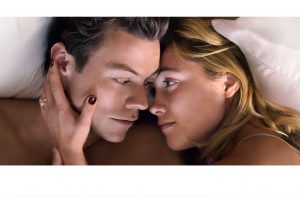EXPECTATIONS can fluctuate.
When I heard that Olivia Wilde’s second directorial effort would be a disturbing drama, I was excited.
Her debut, 2019’s Booksmart, was funny and smart and the new film would also be written by Katie Silberman.
When Francis Pugh was cast as the lead in Don’t Worry Darling, expectations heightened further.
Pugh is one of my favourite actors and her versatility, from Shakespeare to Marvel, seems to know no bounds.
The casting of Harry Styles didn’t raise concern, although I think Shia LaBeouf, whom he replaced, has delivered some great performances in an uneven career.
The trailer was exceptional, but then the publicity started in earnest.
Alleged conflicts on set can be a bad sign, but they can also just signify that productive tension permeated.
Then the publicity seemed to be spiralling out of control and outweighing the art.
First festival reviews were mixed, so it was with lowered expectations that I sat down to finally watch Wilde’s film.
Thankfully, I was engrossed for the first two acts, but the resolution went in a direction and into a sub-genre that is always difficult to pull off and doesn’t particularly interest me.
Olivia’s direction and all the technical aspects, particularly the art and production design and soundtrack, are all first-class.
As you would expect, Pugh is captivating in the lead role and Styles is solid with several excellent scenes.
Chris Pine plays against his normal type and also delivers a strong performance as the head of a new-age, male-dominant cult in 1950s California.
Pugh and Styles play married couple Alice and Jack Chambers who are part of the idyllic community of Victory.
On the surface the manicured homes and streets look like an affluent suburb with similar town centre, all built on the edge of a desert to comfortably house and cater for the workers at a nearby secret government facility and their families.
While the husbands drive off to work each morning, in between housework their wives enjoy the luxuries that the company lifestyle provides, dutifully preparing for their spouses return.
All the workers are male and Pine’s character Frank is the ultimate controlling boss, handsomely rewarding his staff while insidiously insisting on their unwavering support for his company and vision.
Cracks start to appear when the behaviour of one wife becomes increasingly erratic along with her rants against the cult-like existence.
How the woman is treated causes similar questions to surface in Alice’s mind, causing conflict with Jack who is being groomed by the sinister Frank.
A confrontation looms between Alice and Frank that will have severe ramifications for individuals and the entire community.
There are similarities here to the approach and tone of some of the best recent dramas with horror aspects, such as Midsommar and Get Out while the setting and time period hark back to The Stepford Wives.
These are all exceptional films and, while Don’t Worry Darling can favourably compare, the problematic construct and execution of the final act means it doesn’t quite reach the same heights.
But that’s only my opinion. Ignore the social media sideshow, go see it and decide for yourself.
